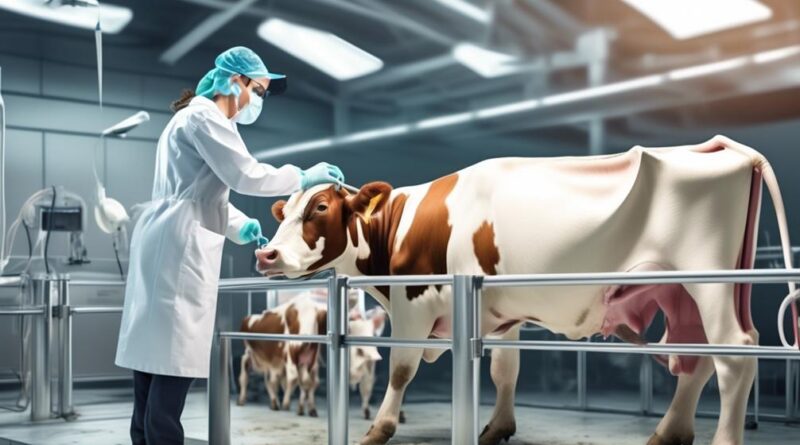Why Use Reproductive Technologies for Cattle Breeding?
Have you ever considered reproductive technologies as the compass that steers the ship of cattle breeding into uncharted waters of genetic refinement and herd improvement?
The world of cattle breeding has been revolutionized by the advent of reproductive technologies, offering a plethora of benefits that go beyond conventional breeding methods. From enhancing genetic selection to optimizing breeding programs, the use of reproductive technologies has become a driving force behind the quest for superior livestock.
But what exactly are these technologies, and how do they impact the cattle industry on a global scale?
Increased Genetic Selection
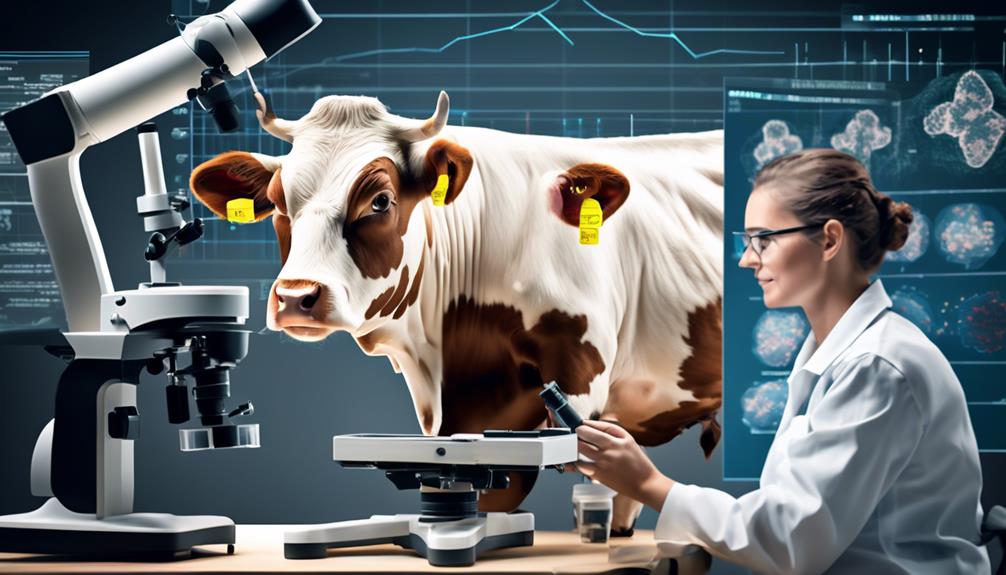
With the use of advanced reproductive technologies, you can now actively increase genetic selection in your cattle breeding program. By utilizing techniques such as artificial insemination (AI) and embryo transfer, you have the ability to strategically choose superior genetics for your herd, thereby enhancing its overall quality and productivity.
Genetic diversity plays a critical role in the long-term success of your cattle breeding program. Through the application of reproductive technologies, you can broaden the genetic base of your herd by accessing elite sires and dams from diverse geographical locations. This not only strengthens the genetic diversity within your herd but also mitigates the risks associated with inbreeding, ultimately contributing to the long-term sustainability of your cattle operation.
Furthermore, the use of advanced reproductive technologies allows you to prioritize animal welfare in your breeding program. By selecting for desirable traits such as disease resistance, heat tolerance, and overall robustness, you can improve the health and well-being of your cattle. Additionally, by actively managing the genetic makeup of your herd, you can reduce the incidence of hereditary health issues, thereby promoting the overall welfare of your cattle population.
Enhanced Reproductive Efficiency
To improve the efficiency of your cattle breeding program, implementing advanced reproductive technologies can significantly enhance the reproductive performance and overall productivity of your herd. Enhanced reproductive efficiency is crucial for maximizing the genetic potential of your cattle and ensuring a sustainable and profitable operation. By incorporating reproductive management strategies and fertility enhancement techniques, you can take proactive measures to optimize breeding outcomes and streamline the reproduction process.
- Embryo Transfer: Utilizing embryo transfer allows you to multiply the impact of your most valuable genetics, enabling superior females to produce multiple offspring and accelerate genetic progress within your herd.
- Artificial Insemination (AI): AI offers the opportunity to use semen from elite sires, providing access to superior genetics and allowing you to breed a larger number of cows to the best bulls.
- Hormonal Synchronization: Implementing synchronization protocols helps align the reproductive cycles of your cows, increasing the number of animals conceiving early in the breeding season and facilitating more uniform calf crops.
- Genetic Testing: By employing genetic testing, you can identify animals with superior reproductive traits, such as higher fertility or increased embryo production, and make informed breeding decisions to enhance overall reproductive efficiency.
- Ultrasound Technology: Utilizing ultrasound for reproductive purposes allows for early pregnancy detection, accurate assessment of reproductive tract health, and improved timing of artificial insemination or embryo transfer, ultimately contributing to better reproductive management and fertility enhancement.
Incorporating these advanced reproductive technologies into your breeding program can elevate the efficiency of your operation, leading to improved reproductive outcomes, increased genetic progress, and ultimately, greater profitability.
Improved Livestock Productivity
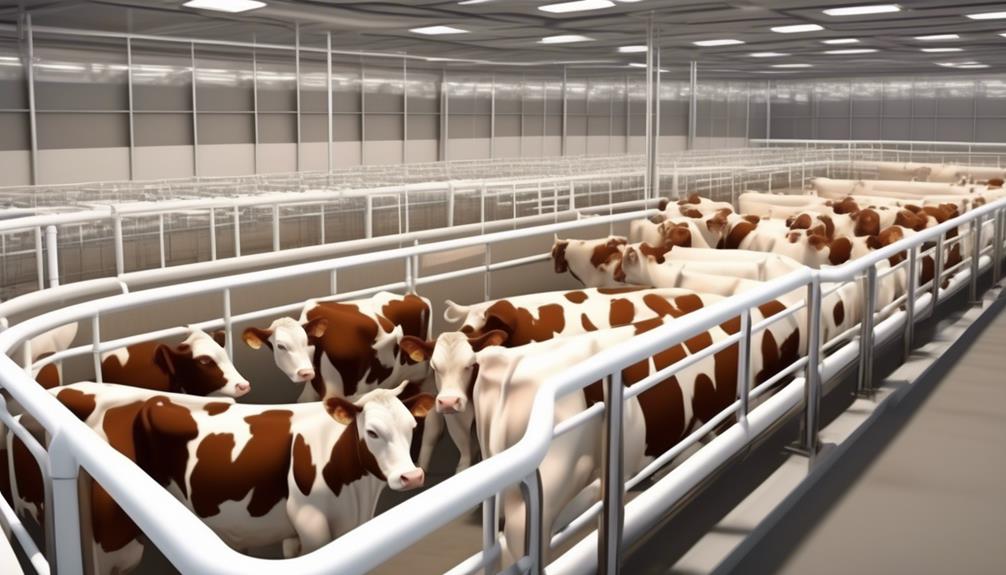
By implementing advanced reproductive technologies, you can't only enhance the efficiency of your breeding program but also significantly improve the overall productivity of your livestock. One of the key advantages of employing these technologies is the ability to enhance genetic diversity within your herd.
Through techniques like artificial insemination and embryo transfer, you can introduce genetic material from superior livestock, thereby diversifying and improving the overall genetic pool of your herd. This genetic diversity can lead to increased resistance to diseases, adaptability to changing environmental conditions, and ultimately, improved productivity.
Additionally, the use of reproductive technologies can contribute to better animal welfare. By selectively breeding for desirable traits such as disease resistance, heat tolerance, and feed efficiency, you can improve the overall health and well-being of your livestock. This not only enhances the quality of life for the animals but also leads to higher productivity and better economic returns for your breeding program.
Moreover, advanced reproductive technologies can enable the selection of specific genetic traits that are conducive to the overall welfare of the animals, ensuring that they aren't only productive but also healthy and thriving.
Disease Control and Prevention
Reproductive technologies offer effective methods for controlling and preventing diseases in cattle breeding. By integrating these technologies into your breeding practices, you can significantly enhance the overall health and well-being of your herd. Here are some key points to consider for disease control and prevention:
- Vaccination Strategies: Utilizing reproductive technologies allows for the implementation of strategic vaccination programs. This ensures that your cattle receive the necessary immunizations to build resistance against common diseases, ultimately bolstering their immune systems and reducing the risk of outbreaks.
- Improved Herd Health: Incorporating reproductive technologies enables you to select for genetic traits associated with disease resistance. By focusing on breeding cattle with inherent resilience to specific illnesses, you can proactively strengthen the overall health of your herd.
- Disease Monitoring: Reproductive technologies facilitate the tracking and monitoring of disease prevalence within your herd. This allows for early detection and rapid response to potential outbreaks, preventing the spread of infections and minimizing the impact on overall productivity.
- Biosecurity Measures: Implementing reproductive technologies provides an opportunity to enhance biosecurity protocols. By controlling breeding environments and utilizing advanced reproductive methods, you can mitigate the introduction and spread of diseases within your herd.
- Adaptation to Environmental Challenges: Reproductive technologies enable the selection of cattle breeds or genetic traits that are better suited to particular environmental conditions, reducing the susceptibility of your herd to prevalent diseases in specific regions.
Environmental Sustainability
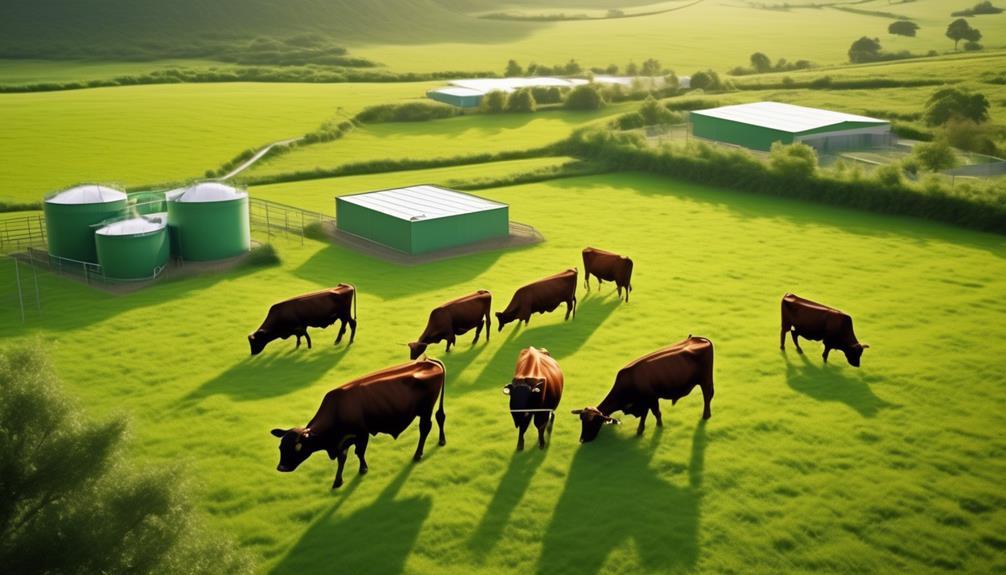
Integrating reproductive technologies into cattle breeding not only enhances disease control and prevention but also lays the groundwork for sustainable environmental practices. By utilizing these technologies, you can contribute to green practices and conservation efforts within the cattle breeding industry.
Reproductive technologies such as artificial insemination and embryo transfer can significantly reduce the carbon footprint associated with cattle breeding. These methods allow for the selection of genetically superior animals, leading to improved feed efficiency and reduced methane emissions, thus positively impacting the climate.
Furthermore, the use of reproductive technologies enables the preservation of valuable genetic traits, thus supporting biodiversity and conservation efforts. By carefully selecting desirable genetic traits, you can contribute to the sustainability of cattle breeding, ensuring that the industry can continue to thrive without compromising the environment.
Additionally, these technologies enable more efficient breeding practices, reducing the need for extensive land use and minimizing the impact on natural habitats. This, in turn, supports sustainability measures, ensuring that cattle breeding can coexist harmoniously with the environment.
Economic Advantages
Utilizing reproductive technologies in cattle breeding can lead to significant economic advantages. Here's how reproductive technologies can provide economic advantages:
- Cost Savings: Reproductive technologies such as artificial insemination and embryo transfer can help reduce the need for maintaining large breeding herds. This leads to lower operational costs and increased efficiency.
- Market Demand: With the use of advanced reproductive techniques, you can meet the growing market demand for superior genetics and high-quality cattle products. This enhances your competitiveness and market positioning.
- Profit Margins: By utilizing reproductive technologies to produce offspring with desirable traits, you can command premium prices for superior breeding stock or high-quality meat. This improves your profit margins.
- Industry Trends: Embracing reproductive technologies allows you to stay aligned with industry trends and advancements. This ensures that your breeding practices remain modern and efficient.
- Increased Productivity: Reproductive technologies can significantly boost the productivity of your herd. This results in higher yields and greater profitability over time.
Optimized Breeding Programs
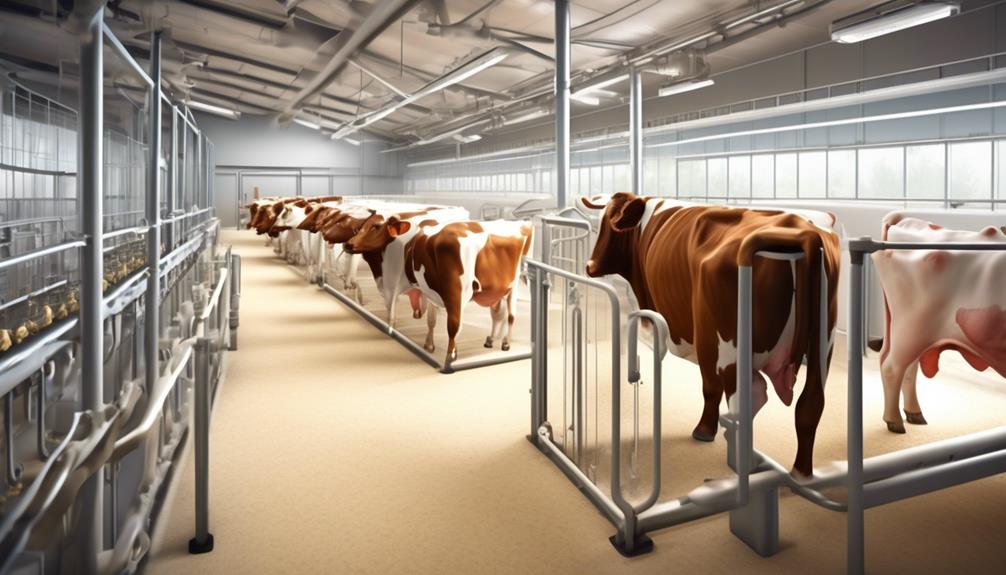
Considering the economic benefits of reproductive technologies for cattle breeding, optimizing breeding programs becomes essential for maximizing productivity and genetic potential. Genetic diversity plays a crucial role in ensuring the long-term success and sustainability of cattle breeding programs. By incorporating reproductive technologies, such as artificial insemination and embryo transfer, breeders can strategically manage genetic diversity to enhance the overall health and resilience of their herds.
These technologies allow breeders to access genetic material from superior animals located in different geographical regions, thereby broadening the gene pool and reducing the risk of inbreeding.
In addition to genetic diversity, optimizing breeding programs also involves prioritizing animal welfare. Reproductive technologies offer the opportunity to select and propagate traits that contribute to the well-being of cattle, such as disease resistance, heat tolerance, and efficient feed utilization. By focusing on these traits, breeders can enhance the overall welfare of their herds, leading to healthier and more robust cattle.
Furthermore, optimized breeding programs can contribute to the conservation of rare and endangered cattle breeds by utilizing reproductive technologies to increase their population numbers and preserve their unique genetic heritage. This proactive approach helps to safeguard genetic resources and maintain the diversity of cattle breeds for future generations.
Ethical Considerations
When implementing reproductive technologies for cattle breeding, it's crucial to address ethical considerations to ensure the well-being and treatment of the animals involved. This involves contemplating the ethical implications of using these technologies and ensuring that they're aligned with the principles of animal welfare.
- Respect for Animal Welfare: It's essential to prioritize the welfare of the animals throughout the breeding process, ensuring that they aren't subjected to unnecessary harm or distress.
- Transparency and Informed Consent: Ethical considerations include being transparent about the reproductive technologies used and obtaining informed consent from relevant stakeholders.
- Minimization of Risks and Harm: Efforts should be made to minimize any potential risks or harm to the animals associated with the use of reproductive technologies.
- Long-Term Impacts: Consideration should be given to the long-term impacts of these technologies on the animals, such as any potential health implications or alterations to natural behaviors.
- Regulatory Compliance: Adherence to relevant regulations and standards pertaining to the ethical treatment of animals is imperative when utilizing reproductive technologies for cattle breeding.
Frequently Asked Questions
How Do Reproductive Technologies in Cattle Breeding Impact the Overall Health and Welfare of the Animals?
When using reproductive technologies in cattle breeding, they can impact overall health and welfare. These methods can influence genetic diversity, animal welfare, and ethical considerations, while also affecting environmental and sustainable practices.
What Are the Potential Long-Term Effects of Widespread Use of Reproductive Technologies on Genetic Diversity Within Cattle Populations?
When using reproductive technologies for cattle breeding, the widespread use may have potential long-term effects on genetic diversity within cattle populations. It's important to consider the impact on genetic diversity over time for sustainable breeding practices.
Are There Any Potential Risks or Drawbacks to Using Reproductive Technologies in Cattle Breeding That Should Be Considered?
When considering potential drawbacks of using reproductive technologies in cattle breeding, it's important to address ethical concerns, such as animal welfare and genetic diversity. These factors should be carefully considered before implementing these technologies.
How Do Reproductive Technologies in Cattle Breeding Align With or Impact Sustainable Farming Practices and Environmental Conservation Efforts?
Using reproductive technologies in cattle breeding can enhance sustainable farming by improving genetics and increasing productivity. However, it's essential to consider the environmental impact and animal welfare to maintain genetic diversity and support sustainable practices.
What Are the Ethical Implications of Using Reproductive Technologies in Cattle Breeding, and How Are These Considerations Being Addressed Within the Industry?
When considering ethical implications of reproductive technologies in cattle breeding, it's important to acknowledge animal welfare, genetic diversity, and environmental impact. Industry responses involve strict regulations, ethical guidelines, and ongoing research to address these concerns.
Conclusion
In conclusion, using reproductive technologies for cattle breeding offers numerous benefits:
- Increased genetic selection
- Enhanced reproductive efficiency
- Improved livestock productivity
- Disease control
- Environmental sustainability
- Economic advantages
- Optimized breeding programs
While there are ethical considerations to take into account, the overall advantages of using these technologies far outweigh the potential drawbacks.
Embracing reproductive technologies can significantly improve cattle breeding practices and contribute to the sustainability and productivity of the industry.
